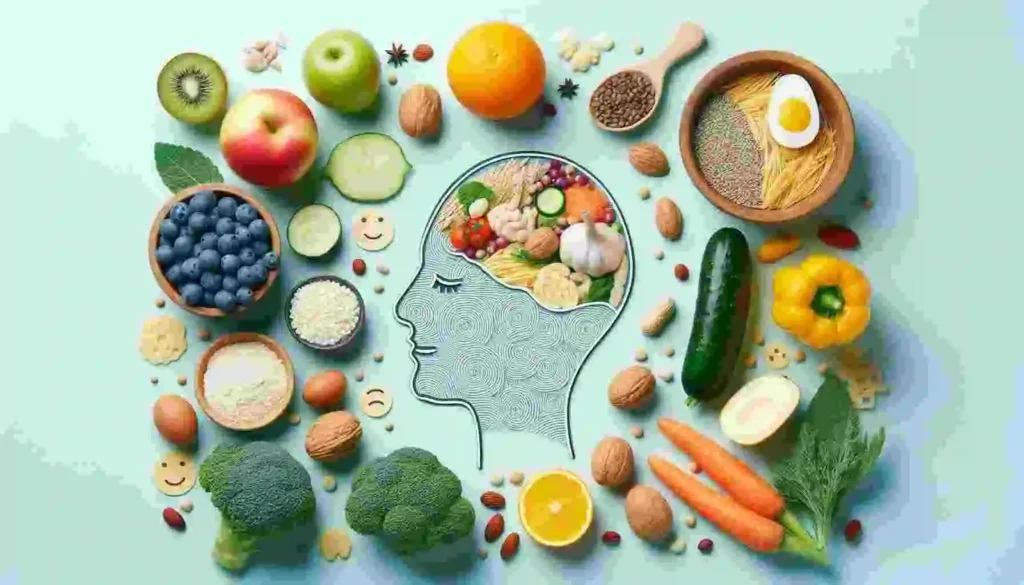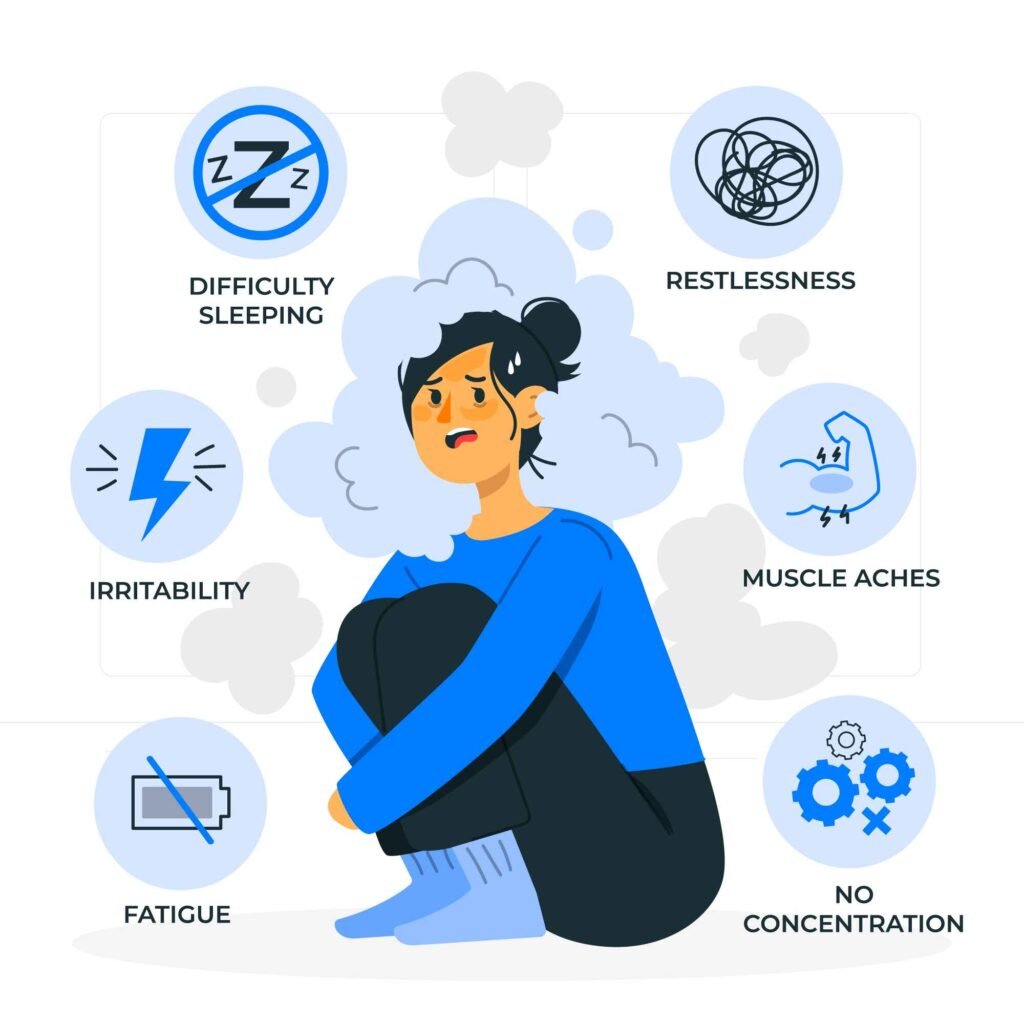
The Role of Nutrition in Mental Wellness: Foods That Can Help Reduce Anxiety and Improve Mood
Introduction: The Connection Between What You Eat and How You Feel
When you think about mental wellness, therapy, exercise, and self-care practices often come to mind. However, one critical element that many overlook is nutrition. The food you eat doesn’t just fuel your body; it also impacts your brain health and mood. Research shows that certain nutrients can significantly affect mental well-being, helping reduce anxiety, stress, and depressive symptoms.
This guide will explore how different foods influence your mental health. You’ll discover specific nutrients and food choices that boost your mood and reduce anxiety.
How Does Nutrition Affect Mental Health?
The Gut-Brain Connection
Your gut and brain connect closely through the gut-brain axis. This connection means your gut health can directly affect your mental state. The gut houses millions of microbes (collectively called the microbiome) that help produce neurotransmitters like serotonin and dopamine, which regulate mood and anxiety.
- Serotonin, often called the “feel-good hormone,” mainly forms in the gut. When gut health suffers, serotonin production may drop, affecting your mood.
A balanced diet rich in fiber and probiotic foods supports gut health, which in turn promotes mental well-being.
Blood Sugar and Mood Swings
Rapid changes in blood sugar levels can cause mood swings, irritability, and fatigue. Foods high in refined sugars cause blood sugar spikes followed by crashes, which negatively impact your mental state.
Choosing foods that promote steady blood sugar levels, such as whole grains, lean proteins, and healthy fats, helps stabilize your mood throughout the day.
Key Nutrients for Mental Wellness
1. Omega-3 Fatty Acids: The Brain-Boosting Nutrient
Omega-3 fatty acids play a crucial role in maintaining brain health and reducing symptoms of anxiety and depression. These healthy fats help build brain cell membranes and reduce inflammation linked to mental health conditions.
Foods Rich in Omega-3 Fatty Acids
- Fatty fish like salmon, mackerel, and sardines
- Chia seeds and flaxseeds
- Walnuts
- Algae-based supplements (for plant-based diets)
Tip: Aim for at least two servings of fatty fish per week or add a tablespoon of chia seeds to your smoothie for an omega-3 boost.
2. Magnesium: The Relaxation Mineral
Magnesium helps calm the nervous system and reduces anxiety. It supports neurotransmitter regulation and lowers levels of the stress hormone cortisol.
Foods High in Magnesium
- Leafy greens like spinach, kale, and Swiss chard
- Nuts and seeds (almonds, pumpkin seeds, cashews)
- Whole grains like brown rice and quinoa
- Dark chocolate (at least 70% cocoa)
Tip: Snack on a handful of nuts or a square of dark chocolate to meet your daily magnesium needs.
3. Vitamin B Complex: The Mood Regulators
B vitamins support energy production and neurotransmitter synthesis, which regulate mood. Deficiencies in B6, B12, and folate often lead to increased anxiety and depression.
Foods Rich in B Vitamins
- Eggs
- Poultry (chicken, turkey)
- Legumes (beans, lentils)
- Leafy vegetables (spinach, broccoli)
- Whole grains (oats, barley)
Tip: If you follow a vegan or vegetarian diet, consider a B12 supplement, as this vitamin primarily comes from animal products.
4. Vitamin D: The Sunshine Vitamin
Low vitamin D levels link to mood disorders, including depression and anxiety. Your body can produce vitamin D through sunlight exposure, but in regions with limited sun, you need dietary sources.
Foods High in Vitamin D
- Fatty fish (salmon, sardines, tuna)
- Egg yolks
- Mushrooms (when exposed to sunlight)
- Fortified foods (dairy alternatives, cereals)
Tip: Spend at least 15-20 minutes in the sun daily or take a vitamin D supplement during winter.
Foods That Help Reduce Anxiety
1. Fermented Foods: For a Healthy Gut and Mind
Fermented foods like yogurt, kefir, sauerkraut, and kimchi contain probiotics — beneficial bacteria that support gut health. A healthy gut can improve neurotransmitter production and reduce anxiety.
How to Incorporate: Add yogurt to your breakfast or enjoy a side of kimchi with your meal.
2. Blueberries: Tiny Powerhouses of Antioxidants
Blueberries pack antioxidants, especially flavonoids, that reduce inflammation and oxidative stress. These compounds improve brain function and lower anxiety.
How to Incorporate: Add blueberries to smoothies, oatmeal, or enjoy them fresh.
3. Green Tea: The Calming Elixir
Green tea contains L-theanine, an amino acid that promotes relaxation without drowsiness. It works with caffeine to enhance focus while easing anxiety.
How to Incorporate: Enjoy 1-2 cups of green tea daily, preferably in the morning or early afternoon.
4. Dark Chocolate: For a Mood Boost
Dark chocolate (70% cocoa or higher) contains flavonoids and magnesium, which lower anxiety levels and boost serotonin.
How to Incorporate: Treat yourself to 1-2 small squares of dark chocolate daily.
5. Avocados: Healthy Fats for a Healthy Mind
Avocados provide monounsaturated fats, magnesium, and vitamin B6, which support brain function and reduce anxiety.
How to Incorporate: Add avocado to salads, toast, or smoothies for a creamy, nutritious boost.
Foods That Help Improve Mood
1. Bananas: Nature’s Instant Pick-Me-Up
Bananas offer vitamin B6 and tryptophan, an amino acid that converts into serotonin. They also give a quick energy boost without a sugar crash.
How to Incorporate: Enjoy a banana as a snack or add it to oatmeal.
2. Fatty Fish: Omega-3 for Mood Stability
Fatty fish like salmon and sardines provide omega-3 fatty acids, which stabilize mood and reduce depressive symptoms.
How to Incorporate: Grill or bake salmon for dinner twice a week or add sardines to salads.
3. Eggs: Protein and B Vitamins for Mental Clarity
Eggs are a complete protein source and contain choline, which supports brain health. They’re also rich in B vitamins that regulate mood.
How to Incorporate: Start your day with an omelette or boiled eggs for sustained energy and focus.How to Create a Balanced Diet for Mental Wellness
The Importance of Whole Foods
A diet focused on whole foods ensures your brain receives the nutrients it needs to function optimally. Whole foods refer to items that are minimally processed and close to their natural state. Think fruits, vegetables, whole grains, nuts, seeds, and lean proteins. These foods provide a balanced mix of vitamins, minerals, and healthy fats that nourish the brain and improve mood stability.
When you rely on processed or fast foods, you miss out on essential nutrients while consuming excess sugar, unhealthy fats, and additives that can harm mental health. By choosing a whole-food-based diet, you give your body and mind the fuel they need to thrive.
Building a Balanced Plate for Mental Health
When planning meals, aim to include a combination of:
- Lean Proteins – Essential for neurotransmitter production.
- Examples: Chicken, fish, eggs, beans, tofu.
- Healthy Fats – Support brain function and reduce inflammation.
- Examples: Avocado, nuts, seeds, olive oil, fatty fish.
- Complex Carbohydrates – Provide steady energy and support serotonin production.
- Examples: Quinoa, brown rice, oats, sweet potatoes.
- Colorful Vegetables – Packed with antioxidants and essential vitamins.
- Examples: Spinach, bell peppers, carrots, broccoli.
- Fermented Foods – Promote gut health and improve mood.
- Examples: Yogurt, sauerkraut, kefir, kombucha.
Mindful Eating for Mental Wellness
Mindful eating practices can also enhance mental wellness. This approach encourages you to:
- Eat slowly and savor each bite to improve digestion and satisfaction.
- Listen to your body’s hunger and fullness cues to avoid overeating.
- Minimize distractions (like phones or TV) during meals to focus on your food.
Practicing mindfulness while eating helps reduce stress and fosters a healthier relationship with food.
Foods That Sabotage Mental Wellness
1. Refined Sugars and Sweets
Refined sugars found in candy, baked goods, and sodas cause sharp spikes and crashes in blood sugar levels. These fluctuations can lead to mood swings, irritability, and fatigue. High sugar intake has also been linked to increased anxiety and depression.
Tip: Replace sugary snacks with natural alternatives like fruit, nuts, or dark chocolate.
2. Processed and Fast Foods
Highly processed foods are often high in unhealthy fats, refined sugars, and additives. These ingredients can lead to inflammation, affecting both gut health and brain function. Studies show that diets high in processed foods correlate with a higher risk of mental health disorders.
Tip: Focus on preparing homemade meals with fresh ingredients to avoid processed options.
3. Caffeine Overload
While moderate caffeine intake can enhance focus and alertness, excessive amounts may cause anxiety, jitteriness, and sleep disturbances. Consuming too much coffee or energy drinks can negatively impact your mental well-being.
Tip: Limit yourself to 1-2 cups of coffee daily and opt for calming alternatives like green tea or herbal teas.
4. Alcohol and Its Effects on Mood
Alcohol can disrupt neurotransmitter balance, impair sleep, and increase anxiety. While it may initially provide a sense of relaxation, over time, it can worsen mental health symptoms.
Tip: If you drink, do so in moderation and consider alcohol-free days to give your body a break.
Easy Recipes to Boost Mental Wellness
1. Omega-3-Packed Salmon Bowl
Ingredients:
- 1 salmon fillet
- 1 cup cooked quinoa
- 1 cup steamed broccoli
- ½ avocado, sliced
- Lemon juice
- Salt and pepper to taste
Instructions:
- Grill or bake the salmon fillet until fully cooked.
- Assemble the bowl with quinoa, steamed broccoli, and avocado.
- Place the salmon on top and drizzle with lemon juice.
- Season with salt and pepper.
This meal delivers a powerful combination of omega-3 fatty acids, complex carbs, and healthy fats.
2. Gut-Healthy Yogurt Parfait
Ingredients:
- 1 cup plain Greek yogurt
- ½ cup blueberries
- 1 tablespoon chia seeds
- 1 tablespoon honey
- ¼ cup granola
Instructions:
- Layer Greek yogurt with blueberries and chia seeds.
- Drizzle honey on top and sprinkle with granola.
This parfait provides probiotics, antioxidants, and fiber for improved gut and mental health.
3. Magnesium-Rich Dark Chocolate Smoothie
Ingredients:
- 1 cup almond milk
- 1 banana
- 1 tablespoon almond butter
- 1 tablespoon cocoa powder (70% or higher)
- 1 teaspoon honey (optional)
Instructions:
- Blend all ingredients until smooth.
- Serve chilled.
This smoothie combines magnesium, B vitamins, and healthy fats to reduce anxiety and lift your mood.
Lifestyle Tips to Complement a Nutrient-Rich Diet
1. Prioritize Quality Sleep
Nutrition and sleep go hand in hand. Poor sleep can affect your food choices, while nutrient-dense foods can improve sleep quality. Aim for 7-9 hours of sleep each night and create a relaxing bedtime routine.
2. Stay Hydrated
Dehydration can impair concentration and increase feelings of anxiety. Drink at least 8 glasses of water daily to keep your brain functioning well.
3. Exercise Regularly
Physical activity releases endorphins and helps manage stress. Pair a balanced diet with regular exercise like walking, yoga, or strength training to enhance mental wellness.
4. Manage Stress Effectively
High stress levels can affect your eating habits and mental state. Incorporate stress-reducing activities like meditation, deep breathing, or journaling into your daily routine.Superfoods for Sustained Mental Health Benefits
1. Turmeric: The Golden Spice for Mental Health
Turmeric contains curcumin, a powerful compound with anti-inflammatory and antioxidant properties. Studies show that curcumin can help alleviate symptoms of depression and anxiety by boosting brain-derived neurotrophic factor (BDNF), a protein that supports brain function and mental clarity.
How to Incorporate Turmeric into Your Diet:
- Add a teaspoon of turmeric to your smoothies or soups.
- Enjoy a cup of golden milk by mixing turmeric with warm milk and a dash of black pepper.
- Use turmeric in curries, stews, or roasted vegetables.
2. Leafy Greens: Brain-Boosting Vegetables
Leafy greens like spinach, kale, and Swiss chard are packed with essential nutrients, including magnesium, folate, and vitamin C. These nutrients help reduce inflammation, combat oxidative stress, and support neurotransmitter production, making leafy greens powerful allies in mental wellness.
How to Add More Leafy Greens to Your Diet:
- Toss spinach into your morning smoothie.
- Add kale or Swiss chard to soups, stews, or stir-fries.
- Make a nutrient-dense salad with mixed greens, avocado, and walnuts.
3. Nuts and Seeds: Small but Mighty Mood Boosters
Nuts and seeds such as almonds, walnuts, pumpkin seeds, and flaxseeds offer a combination of healthy fats, magnesium, and zinc. These nutrients support brain function, improve mood stability, and help manage anxiety.
Easy Ways to Include Nuts and Seeds:
- Sprinkle seeds on your yogurt, oatmeal, or salads.
- Snack on a handful of almonds or walnuts between meals.
- Blend nuts and seeds into smoothies or homemade energy bars.
Creating Sustainable Healthy Eating Habits for Mental Wellness
1. Plan and Prep Your Meals
Planning your meals ahead of time reduces the temptation to opt for processed or fast food. Dedicate a day each week to prepare balanced meals with nutrient-rich ingredients. Having healthy options ready to go helps you maintain consistent eating habits that support mental wellness.
Quick Meal Prep Tips:
- Cook grains like quinoa or brown rice in bulk.
- Pre-chop vegetables and store them in containers for easy access.
- Prepare protein sources like grilled chicken, tofu, or boiled eggs to add to meals.
2. Follow the 80/20 Rule
Maintaining a healthy diet doesn’t mean perfection. The 80/20 rule encourages you to eat nutritious, whole foods 80% of the time, while allowing for occasional indulgences 20% of the time. This balanced approach reduces stress around eating and helps you enjoy a variety of foods without guilt.
3. Stay Consistent with Regular Meal Times
Skipping meals or eating erratically can negatively impact blood sugar levels and mood. Aim to eat balanced meals at consistent times each day to keep your energy levels and mood stable.
Sample Daily Meal Schedule:
- Breakfast: 7:00 AM – Overnight oats with berries and chia seeds.
- Lunch: 12:00 PM – Grilled salmon, quinoa, and steamed broccoli.
- Dinner: 6:30 PM – Stir-fried tofu with brown rice and mixed vegetables.
- Snacks: Mid-morning or afternoon – Greek yogurt, nuts, or fruit.
The Importance of Staying Hydrated
How Dehydration Affects Your Mood
Even mild dehydration can impair cognitive function, cause fatigue, and increase irritability. Drinking enough water supports overall brain health and helps maintain a balanced mood. Aim to drink at least 8 glasses (about 2 liters) of water each day, more if you exercise or live in a hot climate.
Tips to Increase Your Water Intake:
- Carry a reusable water bottle throughout the day.
- Infuse water with citrus slices, cucumber, or fresh herbs for added flavor.
- Set reminders on your phone to drink water every hour.
Supplementing Your Diet for Mental Wellness
1. Omega-3 Supplements
If you struggle to get enough omega-3 fatty acids from food, consider an omega-3 supplement like fish oil or algae oil. These supplements can help reduce anxiety and depressive symptoms by supporting brain function.
2. Probiotic Supplements
Probiotics support gut health, which directly influences mental wellness. If you don’t consume fermented foods regularly, a high-quality probiotic supplement can help maintain a healthy gut microbiome.
3. Vitamin D Supplements
In regions with limited sunlight, a vitamin D supplement is essential for maintaining mood stability and preventing deficiencies that can lead to depression.
Exercise and Nutrition: A Powerful Duo
How Exercise Enhances the Effects of Nutrition
Combining a healthy diet with regular exercise offers powerful benefits for mental wellness. Exercise releases endorphins, which are natural mood boosters, and improves the absorption of key nutrients that support brain health.
Types of Exercise for Mental Health:
- Aerobic Exercise: Activities like running, cycling, or dancing improve cardiovascular health and reduce anxiety.
- Strength Training: Building muscle through weightlifting enhances physical strength and boosts confidence.
- Yoga and Stretching: These practices promote relaxation, reduce stress, and improve flexibility.
- Walking: A simple daily walk in nature can clear your mind and reduce anxiety.
Building a Support System for Nutritional Success
1. Share Meals with Loved Ones
Eating with friends and family can enhance your sense of connection and support mental wellness. Shared meals encourage mindful eating and reduce feelings of isolation.
2. Join a Healthy Eating Community
Consider joining online groups, local workshops, or wellness communities focused on healthy eating. Sharing tips, recipes, and experiences can motivate you to stay on track.
3. Work with a Nutritionist or Dietitian
If you struggle with creating a diet that supports your mental health, a registered dietitian can provide personalized advice and meal plans. Professional guidance ensures you meet your nutritional needs and address any deficiencies.



